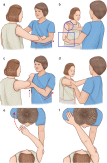The effectiveness of a newly developed reduction method of anterior shoulder dislocations; Sool’s method
Affiliations
- Department of Orthopedic Surgery, Seoul National University Bundang Hospital, Bundang-gu, Seongnam-si, Gyeonggi-do, Republic of Korea
Affiliations
- Department of Emergency Medicine, Seoul National Hospital, Seoul, Republic of Korea
Affiliations
- Department of Emergency Medicine, Seoul National University Bundang Hospital, Bundang-gu, Seongnam-si, Gyeonggi-do, Republic of Korea
Correspondence
- Corresponding author at: Department of Emergency Medicine, Seoul National University Bundang Hospital, 300 Gumi-dong, Bundang-gu, Seongnam-si, Gyeonggi-do, 463–707, Korea. Tel.: +82 10 3424 6718; fax: +82 31 787 4081.

Affiliations
- Department of Emergency Medicine, Seoul National University Bundang Hospital, Bundang-gu, Seongnam-si, Gyeonggi-do, Republic of Korea
Correspondence
- Corresponding author at: Department of Emergency Medicine, Seoul National University Bundang Hospital, 300 Gumi-dong, Bundang-gu, Seongnam-si, Gyeonggi-do, 463–707, Korea. Tel.: +82 10 3424 6718; fax: +82 31 787 4081.
Affiliations
- Department of Emergency Medicine, Seoul National University Bundang Hospital, Bundang-gu, Seongnam-si, Gyeonggi-do, Republic of Korea
Affiliations
- Department of Emergency Medicine, Seoul National University Bundang Hospital, Bundang-gu, Seongnam-si, Gyeonggi-do, Republic of Korea
 Article Info
Article Info
To view the full text, please login as a subscribed user or purchase a subscription. Click here to view the full text on ScienceDirect.

Fig. 1
Sequence of Sool’s method for reduction of anterior shoulder dislocation
Abstract
Objective
Nearly a dozen reduction methods for the treatment of anterior shoulder dislocation have been reported, but the majorities are painful and require patients to be in the supine or prone position. Nearly a dozen reduction methods for the treatment of anterior shoulder dislocation have been reported, but the majorities are painful and require patients to be in the supine or prone position.
Methods
This retrospective cohort study was conducted in a University-affiliated emergency department (ED). Sool’s method and traditional shoulder reduction methods (TSRMs) were performed for the patient with anterior shoulder dislocation. 59 eligible patients were recruited; 35 were treated with TSRMs, while 24 were treated with Sool’s method.
Results
The rate of successful reduction was 80% (26/35) in the TSRM group and 75% (18/24) in the Sool’s method group (p = 0.75). The length of stay (LOS) in the ED was 72.3 min in the Sool’s method group and 98.4 min in the TSRM group (p = 0.037). No significant difference was observed between the neurovascular deficit before and after reduction in either group. The procedural time of successfully reduced cases in patients treated by Sool’s method was shorter than that of the failed cases (p = 0.015).
Conclusions
Sool’s method was as successful as other methods at reducing shoulder dislocation and has demonstrated encouraging results, including significant reduction in LOS in the ED and unnecessary use of sedation. Sool’s method is technically easy and requires only a place to sit and a single operator.
Abbreviations:
ED (emergency department), LOS (length of stay), TSRM (traditional shoulder reduction method)To access this article, please choose from the options below
Purchase access to this article
Claim Access
If you are a current subscriber with Society Membership or an Account Number, claim your access now.
Subscribe to this title
Purchase a subscription to gain access to this and all other articles in this journal.
Institutional Access
Visit ScienceDirect to see if you have access via your institution.
Funding source: The authors have no financial relationships relevant to this article to disclose.
Financial disclosure: The authors have nothing to disclose
Conflict of interest: The authors have no conflicts of interest to disclose.
Copyright transfer: The authors consented to the copyright transfer agreement
Contributors’ Statement: Moon Seok Park, Jin Hee Lee: Dr. Park and Dr. Lee equally conceptualized and designed the study, and drafted the initial manuscript, and approved the final manuscript as submitted.
Related Articles
Searching for related articles..


